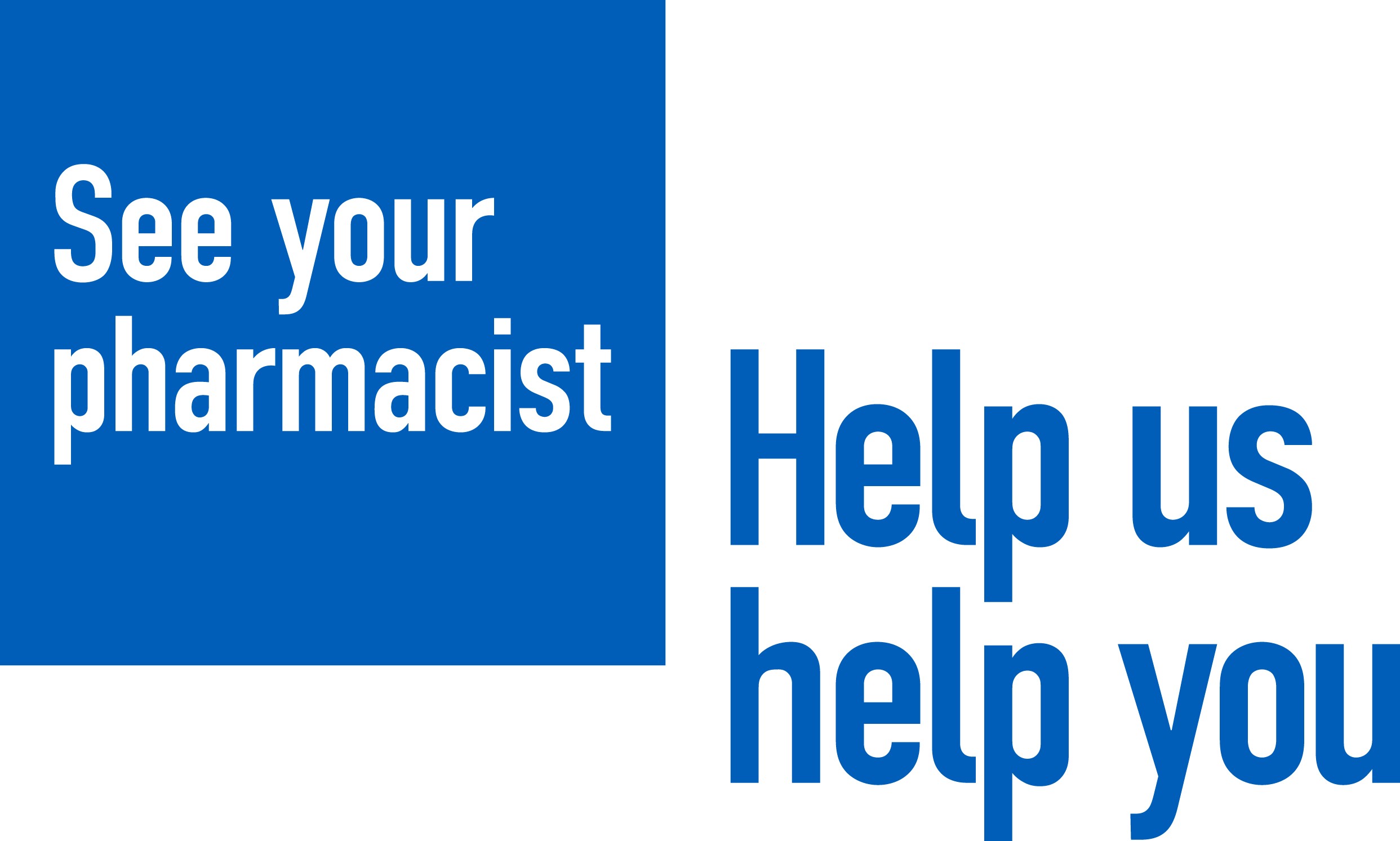Your local pharmacy should always be your first choice for help, advice and treatment for common conditions.
Why?
If you or your family become unwell, you may not always need to see a doctor or get a prescription. Local pharmacies offer many of the same services local GPs do.
Community pharmacists are qualified health professionals who can offer expert advice on lots of minor ailments and conditions. They can help you with common problems such as coughs, colds, aches and pains, as well as perform health checks and screenings and treat minor injuries and ailments.
What common conditions can a pharmacist help with?
Your local pharmacist can help with allergies, athlete's foot, insect bites and stings, common cold, cold sores, conjunctivitis. constipation, coughs, cystitis, decongestants, diarrhoea, dry skin, earache, earwax, fever (children and adults), flu, haemorrhoids, hayfever, headaches and migraines, heartburn and indegestion, mouth ulcers, nappy rash, oral thrush, pain, scabies, sore throat, sprains and strains, sunburn, teething, threadworms, thrush and warts and verrucas.
Visit your Pharmacy First for you or your child
Did you know local pharmacies across advice Black Country can provide advice, treatment, and some prescription medicines without the need to book a GP appointment for you or your child?
Community pharmacists offer free and confidential advice for minor illnesses such as coughs, colds, and eye infection. If appropriate, they can also provide treatment without a prescription for seven common conditions:
- Urinary tract infection (women aged 16-64)
- Sinusitis (adults and children aged 12+)
- Sore throat (adults and children aged 5+)
- Earache (children and young adults aged 1-17)
- Infected insect bite (adults and children aged 1+)
- Impetigo (adults and children aged 1+)
- Shingles (adults aged 18+).
This service takes away the potential delay of having to wait for a GP appointment and may help ensure children get well and back to school as quickly as possible, as well as supporting parents/carers to also get better sooner if they are unwell too.
You can get treatment for these conditions by walking into the pharmacy or contacting them virtually. GP receptionists, NHS 111, and providers of emergency care will also be able to direct patients to pharmacies, that offer the service, if contacted.
For more information on how your pharmacist can help, watch the video on YouTube.
Other benefits from your pharmacy
- You don’t need to make an appointment to see your pharmacist.
- Your local pharmacy will have a consultation room allowing for privacy.
- By visiting a pharmacist first, it helps to make more GP and emergency appointments available for people with more complex healthcare needs.
- Many illnesses can be treated with over-the-counter medicines and advice from your pharmacy.
- A pharmacist will signpost you quickly to the right medical care if you have anything more serious.
- A pharmacist can advise on how long you can expect to experience symptoms for.
Pharmacists across the Black Country continue to offer both flu and COVID-19 vaccinations to those who are eligible.
Check which pharmacy is offering vaccinations near you.
Many common conditions can be treated at home with the support of your local pharmacy if needed. Over the counter products for self-care are things like pain relief, hay fever medication and cough and cold remedies. These items can be bought from pharmacies and supermarkets without a prescription. They are also often cheaper this way. You can get them without an appointment or seeing a doctor.
An important part of self-care is making sure you are equipped to look after you and your family. You can do this by ensuring you have a medicine cabinet fully stocked with essential medicines and products.
Visit our self-care pages - it identifies a range of common ailments and conditions that can be treated at home.
To support self-care at home, keep a well-stocked medicine cabinet with essential medicines and products such as:
- painkillers such as paracetamol and ibuprofen
- antihistamines
- anti-diarrhoeal medicine
- oral rehydration salts
- indigestion treatment
- first aid kit including plasters, bandages and a thermometer.
Visit the NHS website for a full medicine cabinet list.
Don’t keep or use medicines after their expiry date. Take them to your local community pharmacy where they can be disposed of safely.
Some pharmacies offer late-night and 24-hour opening.
If your symptoms do not improve after visiting your pharmacy, or you start to feel a lot worse, contact your GP, call 111 or go online to 111.nhs.uk. A&E and 999 should only be used for life threatening emergencies.
Some patients accessing NHS111 will be referred for an appointment with a community pharmacist depending on their need. GP practices are also referring patients to community pharmacists for minor conditions.
Pharmacy contraception service
Women across the Black Country can now access both oral contraception (the pill) and the morning-after pill directly from their local pharmacy, without the need to see a GP or make an appointment.
This aims to increase choice for patients and make it easier to access contraception when it’s needed. You will still receive your yearly pill check-up, just as you would with your GP.
It is still encouraged to seek medical advice from a pharmacist or doctor if any unusual side effects continue after three months, or if you have any concerns about your contraception.
Find a participating pharmacy for oral contraception near you.
Find a participating pharmacy for the morning after pill near you.






